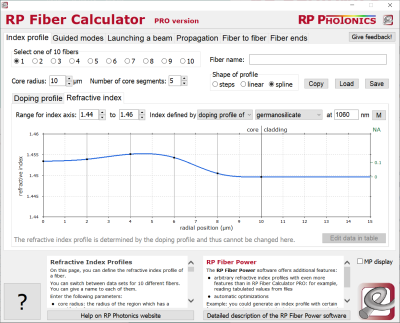
RP Fiber Calculator –
the Convenient Fiber Optics Software
RP Fiber Calculator is a highly convenient software for doing various calculations on optical fibers with radially symmetric refractive index profiles. It has an intuitive graphical user interface with tabs for the following purposes:

- Index profiles: define the radial refractive index profiles. Just click into the diagram to change a profile!
- Guided modes: get the properties of the guided modes calculated: indices l and m (LPl,m modes), effective refractive index, phase constant, effective mode area, fraction of power propagating within the fiber core, cut-off wavelength. The mode solver is powerful, reliable and efficient.
- Launch a beam: define a Gaussian laser beam and possibly misalignment of the fiber end, and get the powers launched into all the guided modes, also the total guided power.
- Propagation: see how the beam profile evolves in the fiber and what is the corresponding far field profile of light exiting the fiber.
- Coupling: calculate how light can be coupled from one fiber to another (a feature of the PRO version only).
An Extremely Useful Tool for Your Everyday Work in Fiber Optics
Even beginners in fiber optics will have no problem getting started with this software. Playing with it trains your intuition and gives you a quantitative feeling and understanding for fiber optics – a great supplement to all the explanations you find on our website. And fiber optics experts will also appreciate to have a highly convenient tool for their everyday work. Use it, for example, to address questions like the following ones:
- How low does the index contrast have to be in order to obtain single-mode guidance? In which wavelength range will that work?
- How many guided modes is my fiber expected to have?
- How quickly will the multimode intensity pattern in the fiber evolve?
- What are the effects of having a central dip in the index profile, or a low-index region around the core, or whatever feature you can imagine? Is the fundamental mode still close to Gaussian-shaped?
- How critical will be a mismatch of beam focus size for launching light into the fiber? How critical are other parameters e.g. for displacements or tilts?
- Is the observed far field pattern consistent with the design parameters?
- What is the insertion loss of a splice between two different multimode fibers? How important is it to have matched core sizes and NA values?
Find this out easily with the software, rather than doing tedious calculations based on equations found in textbooks, or just fishing in the dark. You may also test numerically what you have calculated in order to be sure.
Comparison of Software Versions
Here, you can get a short overview on what the different software versions for fiber optics offer:
| RP Fiber Calculator free version | RP Fiber Calculator PRO version | RP Fiber Power V7 | |
|---|---|---|---|
| Mode solver | LP modes with l, m up to 20 | LP modes with l, m up to 150 | LP modes with l, m up to 150 |
| Refractive index profiles | direct graphical input | direct graphical input, via doping profile (e.g. for germania or fluorine doping) or mathematical expression | via arbitrary mathematical expressions (fully flexible) |
| Chromatic dispersion | – | yes | yes |
| Table of mode properties | yes, with graphical user interface | yes, with graphical user interface | can generate any listings of mode properties via scripting |
| Plots of mode properties | – | yes, as functions of wavelength | can generate any plots of mode properties |
| Export of mode properties | – | yes, in text form with editable format | can generate outputs of any format (text, binary, graphics) |
| Optimization of fiber designs | (no special support) | can display any mode properties and an arbitrarily defined “figure of merit” | can display any mode properties and an arbitrarily defined “figure of merit” |
| Launching a laser beam | yes, with graphical user interface | yes, with graphical user interface | can do this and much more via scripting |
| Evolution of beam profile in fiber | yes, with graphical user interface | yes, with graphical user interface | can do this and much more via scripting |
| Fiber-to-fiber coupling | – | yes, with graphical user interface | can do this and much more via scripting |
| Reflections at fiber ends | – | yes, with graphical user interface | can do this and much more via scripting |
| Numerical beam propagation | – | – | yes, fully programmable |
| Ultrashort pulse and signal propagation | – | – | yes, with chromatic dispersion, nonlinearities, saturable absorbers, filters, etc. |
| Fiber laser and amplifier simulations | – | – | very advanced capabilities, including user-defined level schemes, short and ultrashort pulse amplification, mode locking, etc. (except in the Passive Edition) |
| Scripting | – | can define refractive index functions (e.g., Sellmeier formulas) | extremely powerful script language: can do full-blown programming |
| Documentation | in the program and on the website | in the program and on the website | PDF manual with over 100 pages; context-sensitive online help system |
| Technical support | not included, but bug reports and suggestions are welcome | 4 hours commercial 2 hours non-commercial including advice on related scientific issues | 8 hours commercial 4 hours non-commercial including advice on related scientific issues |
Our most powerful fiber optics software is RP Fiber Power – see the comprehensive description. If you work with passive fiber only, the cheaper “Passive Edition” will be sufficient.
If you have any further questions or need a quotation:
